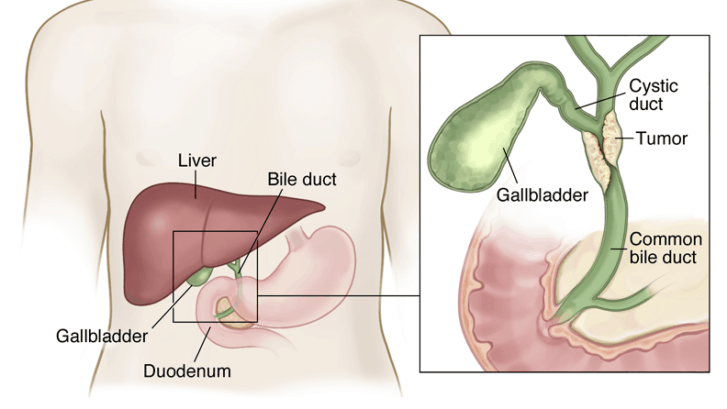The gallbladder is a bag-like organ below the liver. Its primary role is to store the digestive juice called bile made by the liver. When you eat your meals, the gallbladder receives the information and drains the bile that you have saved. Bile flows from the gallbladder through the bile duct into the duodenum, aiding in the digestion process. The gallbladder, bile duct, and papilla are collectively called the bile duct system or biliary system.

Bile duct cancer is the ninth most common cancer in men and seventh in women. Moreover, the number of older people in their 70s and 80s has increased the risk of the disease, since the 50s. The bile duct cancer and papillary cancer tend to occur in men, and gallbladder cancer tends to occur in women. Recently, some researchers reported that one of the causes of cholangiocarcinoma is increased due to the long-term use of dichloromethane and dichloropropane that has used in printing operations.
Bile duct cancer is a malignant tumor that begins in the epithelium of the bile duct (mucosa covering the inner surface of the bile duct). The type of bile duct cancer depends on the location of the bile duct that has arisen and is divided into extrahepatic cholangiocarcinoma of the hilar region, distal cholangiocarcinoma, and intrahepatic cholangiocarcinoma. Intrahepatic cholangiocarcinoma is sometimes called cholangiocellular carcinoma. Also, according to the handling rules, intrahepatic cholangiocarcinoma (cholangiocellular carcinoma) is treated as liver cancer and is treated as primary liver cancer, together with hepatocellular carcinoma. These bile duct cancer, gallbladder cancer, and papillary cancer are collectively called biliary Suguru tract cancer.
In this article, I will show you how fucoidan help to work on bile duct cancer.
According to Suguru Fukahori et al., “Fucoidan, a major component of brown seaweed, prohibits the growth of human cancer cell lines in vitro” their current study examined the anti-tumor effect of Okinawa Mozuku fucoidan on 15 human cancer cell lines (six hepatocellular carcinomas, one cholangiocarcinoma, one gallbladder cancer, two ovarian cancers, one hepatoblastoma, one neuroblastoma, three renal cancers) by using an MTT assay. Chronological and dose-dependent suppression of cell proliferation was observed in 13 out of the 15 lines. Fucoidan suppressed cell proliferation in a time-dependent and dose-dependent manner at various degrees, and its effects were particularly pronounced in the HCC, cholangiocarcinoma (bile duct cancer), and gallbladder carcinoma cell lines. The results indicate that the mechanisms of fucoidan action include the induction of apoptosis and the inhibition of the cell cycle.
I think Fucoidan could be a potential anti-tumor remedy for specific cancers, such as HCC or cholangiocarcinoma.
